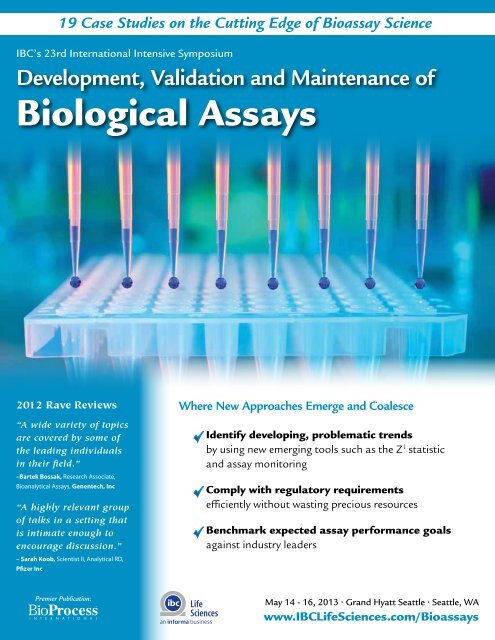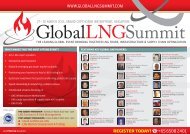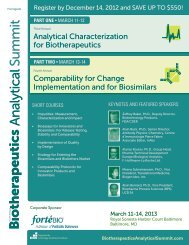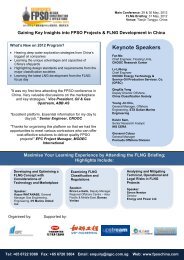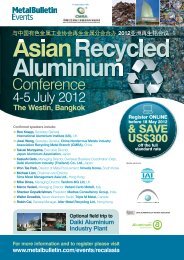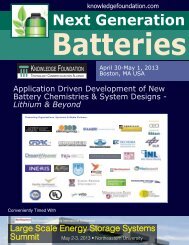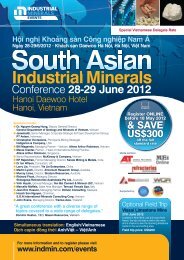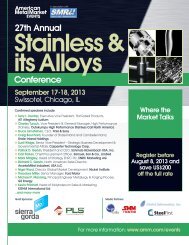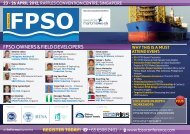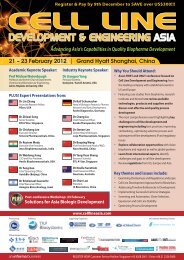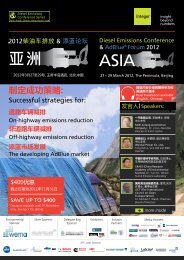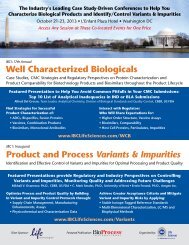Biological Assays
Biological Assays
Biological Assays
- No tags were found...
Create successful ePaper yourself
Turn your PDF publications into a flip-book with our unique Google optimized e-Paper software.
9 Case StudiesMain Conference Thursday, May 16, 20137:30 Coffee8:00 Welcome and Chairwoman’s Opening RemarksSally Seaver, Ph.D., President, Seaver Associates LLCWhich Bioassay?8:10 A Case Study Comparison of an ADCC Bioassay to anFcγRIIIa Binding Assay for Monitoring Fc Effector Functionof a Therapeutic AntibodyMany therapeutic antibodies with oncology indications are thought to effecttumor killing through activation of Fcγ receptor mediated antibody-dependentcellular cytotoxicity (ADCC). Typical ADCC bioassays use peripheral bloodmononuclear cells (PBMC) to rank order antibody variant clones for theirability to mediate ADCC in vivo. We present data for a clinically relevantantibody in which samples modified by stress conditions, acceleratedstability, and variation in fucosylation level were analyzed. Activities correlatewell between an FcγRIIIa binding assay, a PBMC-based ADCC assay, and acommercial cell-based ADCC reporter assay suggesting that alternatives tothe PBMC-based ADCC assay may be suitable for monitoring changes inantibodies that can occur during long-term stability.Carmelata Chitikila, Ph.D., Senior Scientist, Janssen R&D LLC8:50 Impact of Monoclonal Antibody Aggregates on in-vitro<strong>Biological</strong> ActivitiesThe in-vitro biological activity of aggregates may be less than, similar or greaterthan the antibody monomer depending on the drug mechanism of action,aggregate composition, valency and orientation of the antibody molecules. Severalcase studies will be presented to demonstrate the impact of monoclonal antibodyaggregates on complementarity determining region (CDR) and Fc mediated in-vitrobiological activities. The challenges of translating aggregate-mediated impacts onin-vitro biological activities to in vivo biological activity are discussed.Thomas W. Arroll Ph.D., Principle Scientist, Amgen9:30 Should a Replacement Assay be Equivalent?<strong>Assays</strong> frequently need to be replaced for a variety of reasons, such as theinstrument is no longer supported, or the methodology is improved. When thesereplacement assays are developed, they frequently have less variability and biasthen the current method. Ideally, one would like for the results to be same forboth bioassays so that the specifications and stability curves will remain thesame. What should be done when this is not the case? What if the change madein the bioassay now allows for a more correct measurement to be made of thesample? This new measurement is now larger than the current measurement.How does one bridge between bioassays in this case? Some case studiesinvolving changing dissolution, antibodies and instrument are discussed.Charles Miller, Ph.D., Statistician, Merck10:10 Networking Refreshment BreakMonitoring the Bioassay10:40 Mini-Tutorial:Fundamental Aspects of Statistical Process ControlThis mini-tutorial reviews the construction of "X-bar" and "R" charts, twoexamples of the many types of statistical process control (SPC) charts.Although there are many rules for detecting special out-of-control situations,only two general rules will be advocated as sufficient – the 3-sigma ruleand the run-of-eight (or -ten) rule. Using more rules often leads to anunacceptably high rate of false positives. Finally, the important differencebetween SPC limits and specification limits will be emphasized.Stanley N. Deming, Ph.D., President, Statistical Designs11:20 Establishing Early SPC Criteria – Triumphs and TribulationsA multi-well cell based potency bioassay was developed and validated tosupport release and stability testing of GMP drug substance targeting oneof GPCRs. This presentation analyzes bioassay validation strategy includingrobustness results and system suitability criteria establishment.Anton Stetsenko, M.D., MBA, Principal Scientist, Fresenius Kabi12:00 Lunch on your own1:30 Use of SPC Tools to Capture TrendsAbstract unavailable at press date. Please visitwww.IBCLifeSciences.com/Bioassays for program updates.Presenter to be announced2:10 Validate, Monitor, Investigate, Remediate: The TurbulentLife of an ELISA MethodA case study is presented which demonstrates the importance of assaymonitoring to quickly identify method performance concerns. A subsequentlaboratory investigation indicated both obvious and subtle causes of assayfailures, each of which required remediation. It is a reminder of the importanceof a thorough failure investigation, and that sometimes the seemingly lesssignificant problems are the most challenging to identify and resolve.Julie Smith, Ph.D., Team Leader, Syngenta2:50 Oral Poster PresentationsOutstanding posters will be selected and each author will be asked to give a10 to 15-minute presentation. This session is designed to generate discussionabout cutting edge and evolving projects.3:30 Networking Refreshment BreakValidation and the After Life of an Assay4:00 Comparison of Statistical Approaches for EstimatingPotency Assay Validation ParametersDuring routine data analysis, relative potency is rarely treated as a lognormaldistributed variable and most analyses are performed using equations thatapply to a normal distribution. We will present comparisons across multipleapproaches to estimate the mean relative potency (e.g. normal mean vs.geometric mean vs. true lognormal mean) and associated confidence intervals,and the CV (e.g. CV assuming normal distribution vs. true CV vs. geometricstandard deviation) and associated confidence intervals. Simulated dataare presented that establish the importance of using correct and consistentdefinitions of validation parameters for bioassay data analysis.Abhishek Mathur, Ph.D., Senior Scientist, Amgen4:40 Bioassay Development and Implementation underConstrained ConditionsStrategic decisions are required for each development program regarding themost efficient pathway for bioassay development. Two approaches, trendcharting and platform assay formats, have proven to be useful. Variablepotency control samples (e.g. stress degraded, proteolyzed, and aggregatedproduct) should be prepared as early as possible, with additional controlsbeing prepared throughout process development. Thus an evolving panelof samples is available to use as specificity and proficiency controls duringassay optimization, transfer and qualification. With careful managementand data tracking, such samples provide valuable information regardingassay performance.Kenneth B. Lewis, Ph.D., Principal Development Scientist, CMC Biologics5:20 Evaluation of Processes for Reducing and Monitoring AssayVariability for Bioassays within and between LaboratoriesWithin the life cycle of a product, several developmental phases of apotency assay usually occur including transfer of the assay among multiplelaboratories. A major challenge with potency testing is the establishment ofconsistency of results by reducing and maintaining assay variability. Someessential processes to reduce and evaluate variability are 1) identification ofassay components responsible for major assay variation; 2) identificationand qualification of critical reagents; 3) bridging of reference sera to a“standard”; 4) documented analyst training program; and 5) conformationof consistent assay performance with proficiency testing.Janet L. Lathey, Ph.D., Director, Immunology and Assay Validation,Emergent BioSolutions6:00 Close of ConferenceFor up-to-date program information and new abstracts, visit: www.IBCLifeSciences.com/Bioassays 5
Make Your Company Known to<strong>Biological</strong> Assay AudienceWith competition for the market’s attention strongerthan ever, we understand that your company needsto extend reach beyond your booth in order to buildrelationships and connect with attendees. Bioassayssponsorships offer a variety of ways for you to raiseyour company’s awareness in this valued market bothpre-show and on-site.High Visibility Speaking Sponsorships:• Technology Workshop Sponsor• Strategic Discussion Group Sponsor• Session Sponsor• Luncheon Presentation Sponsor• Networking Cocktail ReceptionBranding Sponsorships:• Internet Café• Badge/Lanyard• Registration Area• Conference Tote Bags• Refreshment BreaksAdditionalSponsorshipOpportunities/Exhibit Upgrades• Focus Group Sponsor: Bring together a small selective group of“Key” delegates to discuss issues and share ideas/solutions.• Literature Sponsorship: Includes distribution of marketingmaterials from Resource Center & signage.• Webinar: Connect with key prospects, showcase your thoughtleadership and receive qualified leads.Marketing OpportunitiesInterested in participating as a exhibitor or sponsorat <strong>Biological</strong> Assay Development, Validation& Maintenance?To learn more, please contactJennifer Thebodo, Sales Manager,Sponsorship & Exhibits, at 508-614-1672or jthebodo@ibcusa.comConfirmed Exhibitors:“Great conference with excellent content.There was nearly no redundancy and all thetopics complemented each other.“– Dr. Leonard Blackwell, Principal Scientist, BioTherapeuticsPharmaceutical Sciences, PfizerTake an Active Role in the Conferenceand Present a PosterAny registered conference attendee may register to present a poster.The deadline to submit an abstract online is April 16, 2013 to havethe abstract be included in the conference materials. Full paymentof conference registration and poster fees must be receivedby this date for the abstract to be included in the conferencematerials and a poster board assignment to be made (see theregistration page for details on the poster fee). Posters shouldbe PORTRAIT orientation, with maximum dimensions of 36inches wide (3 feet) x 48 inches high (4 feet). Please note: Posterpresentations may not be used as exhibit displays or for marketingpurposes, and all posters are subject to approval by conferenceorganizers. Only one poster presentation is allowed per registeredattendee/author.Your poster may be selected foran oral presentation!Outstanding posters will be selected and each author will be asked togive a 10 to 15-minute presentation. The oral poster session is designedto generate discussion about cutting edge and evolving projects.Join the growing list of companies who have benefitedfrom exhibiting/sponsoring in past years:BSL Bioservices • Catalent • Cisbio US Inc • Eurofins Lancaster Labs• Gyros Inc. • Lonza • Meso Scale Discovery • Promega Corporation“Good balance of key opinion leaders withindividuals on the front lines facing thechallenges implementing best practices.”– Dr. Matt Hanson, Senior Scientist, Quality Assurance, Promega Corporation6 Register Early for Best Savings www.IBCLifeSciences.com/Bioassays 800-390-4078
3EASYWAYSTO REGISTER:CALL800.390.4078 or+1.941.554.3500@EMAILreg@ibcusa.comPriority Code: B13177pdfwdlWEBwww.IBCLifeSciences.com/BioassaysIndustry Fees By Jan. 18, 2013 By Feb. 22, 2013 By March 22, 2013 By April 19, 2013Standard RateAfter April 19, 2013Main Conference Plus Workshop $2099 $2199 $2299 $2399 $2599(Tues.-Thurs) BEST VALUE!Main Conference (Wed.-Thurs.) $1699 $1799 $1899 $1999 $2199Academic/Govt. Fees By Jan. 18, 2013 By Feb. 22, 2013 By March 22, 2013 By April 19, 2013Standard RateAfter April 19, 2013Main Conference Plus Workshop $1099 $1199 $1299 $1399 $1599(Tues.-Thurs) BEST VALUE!Main Conference (Wed.-Thurs.) $899 $949 $1049 $1149 $1349Academic/Government rate is extended to full-time employees of government, universities and university-affiliated hospitals only.Present a Poster to Enhance Your Conference ExperienceAll poster presenters must be registered conference attendees.The fee to present a poster in addition to your conference registration is:Vendors/Supplier*: $300Pharma/Biotech: $100Academic/Government: FREE* Vendor rate is for exhibiting/sponsoring companiesand/or posters that upon review are of commercial/product focusWays to Save onYour Conference RegistrationRegister Early:The earlier you register the lower the fee and the more youwill save!Send a group of 3 and the 4th goes FREE!It’s a fact – attendees walk away with the most value whenthey experience it with a peer – there is just too muchinformation available for one person to capture it all.As a result, we are pleased to offer a 4th free registrationwhen you register 3 people at the standard rate. For moreinformation call our group sales advocate at 646-895-7445.Academic and Government Special RatesFull-time employees of a government organization,universities and university-affiliated hospitals are eligible totake advantage of over a 40% savings off industry rates.Your Colleague Is Speaking atthis ConferenceIf you are from a company that is already sending anotherperson to present at this conference, you qualify for a 20%discount off the standard rate. Contact your colleague whois speaking for their discount code.Your Company Is Exhibitingor Sponsoring this EventIf you are from a company that is exhibiting or sponsoringthis event, you qualify for a 20% discount off the standardrate. Contact your marketing person for the discount code.Venue and AccommodationsGrand Hyatt Seattle721 Pine Street, Seattle, WA 98101https://resweb.passkey.com/go/biodev2013 • Tel: 402-935-5352Please call the hotel directly at the numbers above before April 22, 2013 to be included in IBC's dedicatedSpecial Conference Rate$215 Per Night Plus Taxroom block for this conference. Please identify yourself as a participant in IBC’s <strong>Biological</strong> Assay Developmentconference to receive the reduced room rate. Be sure to make you reservations as soon as possible as rooms tendto fill up very quickly and all reservations are subject to availability.Additional Registration InformationFor onsite registrations, please add $100.Program content and speakers subject to change. Conference badges are non-transferable and lost badges willnot be replaced without payment of the full conference registration fee.Please note that payment is required in advance of the conference. Please make check(s) (in U.S. funds drawn ona U.S. bank) payable to IBC Life Sciences and attach to the registration form. Confirmation of your booking willbe sent. Should you elect to pay by MasterCard, Visa or American Express, please send your credit card number,expiration date, name as it appears on card and signature along with the registration form.Registration Substitutions/Cancellations: If you need to make any changes or have any questions, please feel freeto contact IBC’s customer service team via email at reg@ibcusa.com. Cancellations must be in writing and mustbe received by IBC prior to 10 business days before the start of the event. Upon receipt of a timely cancellationnotice, IBC will issue a credit voucher for the full amount of your payment, which may be applied towardsregistration fees at any future IBC event held within 6 months after issuance (the “Expiration Date”). All creditvouchers shall automatically expire on the Expiration Date and shall thereupon become void. In lieu of issuanceof a credit voucher, at your request, IBC will issue a refund less a $595 processing fee per registration. Registrantsare advised that no credit vouchers or refunds will be issued for cancellations received 10 business days or lessprior to start of the event, including cancellations due to weather or other causes beyond the Registrant’s control.IBC therefore recommends that registrants allow for unexpected delays in making travel plans. Substitutions arewelcome at any time. If for any reason IBC decides to cancel this conference, IBC accepts no responsibility forcovering airfare, hotel or other costs incurred by registrants, including attendees, sponsors, speakers and guests.SPECIAL NEEDS: If you have a disability or special dietary needs, please let us know in order that wemay address your special needs for your attendance at this show. Please send your special needsvia email to custserv@ibcusa.com. For up-to-date program information and new abstracts, visit: www.IBCLifeSciences.com/Bioassays 7
Register Early for the Best RateOne Research Drive, Suite 400AWestborough, MA 01581, U.S.A. B13177MIf you have changed roles at your company or are unable to make it to this event, please pass this along to someone elseat your company who might be interested in attending.Incorrect Mailing Information: If you are receiving multiple mailings, have updated information or would like to be removed from our database,please contact our database team at 646-895-7417. Please keep in mind that amendments can take up to 6 weeks.From Bioassay Basicsto Today’s Cutting EdgeTools and Case Studies…We Cover it All!IBC’s 23rd International Intensive SymposiumDevelopment, Validation and Maintenance of<strong>Biological</strong> <strong>Assays</strong>May 14 - 16, 2013 • Grand Hyatt Seattle • Seattle, WANew Case Studies Designed to Keep You at the Cutting Edge of Bioassay Science• Develop an Analytical Cell Bank with the RightQuality System to Support Its Manufacture• Achieve Efficient Optimization of Stable and RobustPlates for Bioassays with Z l Statistic• Overcome the Main Challenge with EquivalenceTesting: Establishing Goal Posts• Maximize Design of Experiments (DOE) forDevelopment, Optimization and Validation Strategies• Bridge <strong>Assays</strong> When New Methods GiveDifferent Results• Establish Early Acceptance Criteria to Initiate aStatistical Process Control (SPC) Programwww.IBCLifeSciences.com/Bioassays


